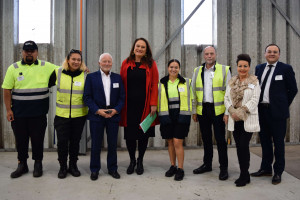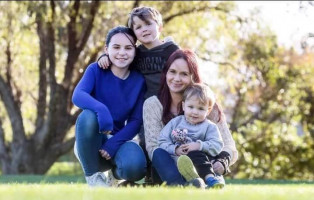Ka āta mahi mātou kia kuhu, kia noho tonu te hunga o Aotearoa ki te ao mahi We worked proactively to get and keep New Zealanders in the workforce
Many clients come to us with complex needs that can present barriers to finding and staying in work. We take a holistic approach to working with people to support their employment and other needs (such as income and housing).
Helping people move from benefits to jobs
This financial year has seen the highest level of annual work exits on recent record (more than 113,000), with many months returning their highest totals in around 20 years.
MSD has service centres in most towns across New Zealand, and staff in these offices utilise their local knowledge to deliver employment support that is best suited to the needs of their regions and clients. We also contract services regionally to meet the needs of clients in their local areas and to complement the nationally driven employment initiatives.
We work to meet the employment needs not only of clients who are already accessing income support, but also of those who are at risk of entering the welfare system.
We have a range of programmes tailored towards people with different employment needs.
This year in response to COVID-19 we increased staffing for our Rapid Response Teams, who work proactively with businesses and employees affected by COVID-19, to let them know what services and support we can provide.
In the regions we continued to support people to obtain, retain and sustain employment and consequently reduce the impact of COVID-19. Our employment centres continued to operate at all COVID-19 alert levels, enabling employment-focused staff with local knowledge to respond to employers’ and jobseekers’ needs.
Because we now take a more proactive approach to helping people find and keep work, we can respond better to a volatile labour market and increased demand for employment assistance than we could in previous economic downturns such as the Global Financial Crisis in 2008.
Delivering employment support through a range of channels
Our employment services are delivered through various channels, ranging from in-person and over-the-phone services such as employment case management, work brokerage, job matching and contracted community providers and partners, to a range of products and services that enable people to return to the labour market, such as Transition to Work Grants and wage subsidies (Flexi-wage).
Employment case managers engage face to face with clients who need support to take steps towards work. Our employment case management approach prioritises support to key groups (such as Māori, Pacific, rangatahi, people with disabilities and health conditions, and people with children). Work brokers partner with employers to link our clients to their vacancies.
Contracted community providers deliver specific work-related services to our clients. These include short-term training for work courses, and other work-readiness and employment programmes. These services range in intensity depending on the needs of the client and are generally delivered face to face.
Our Industry Partnerships team partners with employers to deliver Skills for Industry programmes, in which clients receive on-the-job training that is intended to lead to an employment outcome. As an example, the Construction Accord builds on partnerships with Auckland Council, the Mayors’ Taskforce for Jobs and Waka Kotahi NZ Transport Agency to deliver employment opportunities in the construction sector. In the year to 30 June 2021, 4,245 people participated in Construction Accord partnerships.
Extending employment programmes
Flexi-wage was increased in February 2021 to support up to an additional 40,000 people into work over two years, compared to around 6,000 previously. Flexi-wage helps jobseekers get the skills they need to meet the requirements of a job. Support can include training and in-work support, as well as a contribution to wages (paid to the employer).
As at 30 June 2021, there were 9,816 placements in the Flexi-wage programme, of which 4,782 occurred since the February expansion.
Mana in Mahi was increased in August 2020 to include more support for participants and their employer during a participant’s training. Mana in Mahi supports those most disadvantaged in the labour market into sustainable work, through industry training.
Mana in Mahi placed 2,526 people into jobs in 2020/21, against a target of 450.
Apprenticeship Boost was launched in August 2020 in collaboration with the Tertiary Education Commission, and was extended in March 2021. It supports employers to retain apprentices and take on new apprentices as the economy recovers from the impacts of COVID-19.
Apprenticeship Boost supported 13,160 employers with 30,031 apprentices in work.
Connected was launched in August 2020 as an all-of-government online, phone and face-to-face initiative connecting people who are looking for a job directly with employers. It also offers a wide range of employment, education and training support.
By 30 June 2021, 229,000 people had used the connected.govt.nz service online.
Rapid Return to Work (RRtW) is a new phone- and email-based initiative, through MyMSD, to support newly unemployed people for up to six weeks to reconnect with employment as quickly as possible
By 30 June 2021 the Rapid Return to Work initiative had supported around 8,500 clients and around 3,000 exits into jobs.
$5k to Work was introduced to replace $3k to Work in October 2020 to allow clients to relocate for employment opportunities. The increase reflected the current cost of living as the grant had not been reviewed since it was developed in November 2015.
By 30 June 2021, nearly 3,200 clients had used the $5k to Work product to relocate for sustainable employment.
Other financial support products such as Transition to Work and Course Participation Assistance also received increased funding in 2020/21 to meet the demand of additional clients.
Targeting groups traditionally disadvantaged by the labour market
Long-term issues for Māori, Pacific peoples, women, and disabled people remain, as we still have a significant gap in overall outcomes for those groups compared to other population groups.
Māori-focused employment programmes
Paiheretia te Muka Tāngata was developed in 2020/21 in partnership with Te Puni Kōkiri, Ara Poutama Aotearoa (Corrections), MSD and iwi to support both tāne and whānau who are impacted by the corrections system
Support for disabled people to find work
Our disability employment services are specific and targeted contracted services that provide employment support to help disabled people into work.
Between 1 July 2020 and 30 June 2021
- 5,500 people participated in disability employment services
- 1,971 people have been supported into work.
Oranga Mahi supports MSD clients living with health conditions or disabilities, and those at risk of losing employment, to improve their health and wellbeing and achieve sustainable outcomes. In 2020/21 we extended existing Oranga Mahi trials into other regions:
- Here Toitū focuses on helping people on a benefit who have a health condition or disability to improve wellbeing and take steps towards employment. It also provides an early response service for those at risk of losing employment because of health reasons. Here Toitū was already running in Auckland and Canterbury and was extended to the Central region.
- Take Charge focuses on youth who live with common mental health needs or substance addiction and want help to look for or stay in employment – it was already in Canterbury and was extended to the Auckland region.
- Individual Placement and Support (IPS) supports people with severe mental health conditions to find and stay in employment. IPS has been operating in Waitematā District Health Board and is being extended to include Auckland and Counties Manukau DHBs.
Connecting people to jobs using digital channels
To support clients during and after the lockdowns, we adapted the way we worked with clients and the systems we used.
We modified employment initiatives to work with a larger and different type of client group from those usually supported – a mix of newly unemployed, skilled people who’d seldom been out of work or had not needed to access our employment services before.
Our digital employment services were an important tool for connecting people with employers and job opportunities. They allowed employees and employers to interact with the labour market in a way that suits them better.
Digital employment initiatives included:
- Rapid Return to Work (RRtW), a new phone- and email-based initiative to support newly unemployed people, who can opt in through MyMSD. The initiative supports people for up to six weeks to reconnect with employment as quickly as possible. It has supported around 8,500 clients and around 3,000 exits into jobs
- Work and Income Online Recruitment Tool, which was launched as part of our response to COVID-19 to connect employers with people looking for work. Employers can list jobs on the platform and anyone looking for work (both clients and other jobseekers) are able to apply for the jobs directly - 7,199 employers and 34,759 jobseekers have used this tool
- Connected, launched in August 2020 as an all-of-government online, phone and face-to-face initiative connecting New Zealanders who are looking for a job directly with employers. It also offers a wide range of employment, education and training support – 229,000 people had used the service online by 30 June 2021
- Click to Enrol, which allows Jobseeker Support and Sole Parent Support clients to self-refer to employment services through MyMSD
- Virtual Job Expo, launched in November 2020 as part of our response to COVID-19. The first pilot supported MSD to recruit frontline staff, and the second (launched in March 2021) supported Auckland MSD staff to continue to offer recruitment services to employers during alert level changes. The platform was used to run recruitment seminars as well as one-to-one interviews. Approximately 41 jobseekers and six employers participated in the Virtual Job Expo pilots by 30 June 2021.
Using regional knowledge to support locals into work
Our 11 regional offices use their local knowledge to tailor employment support to the needs of their regions and clients. We also contract services regionally to meet the needs of clients in their local areas and to complement the nationally driven employment initiatives.
In the regions we continued support to lessen the impact of COVID-19. We increased staffing for the Rapid Response Teams (regional teams who work directly with businesses and employees affected by COVID-19, to let them know what services and support MSD can help with). Our employment centres continued to operate at all COVID-19 Alert levels, enabling employment-focused staff with local knowledge to respond to employers’ and jobseekers’ needs.
Our regions also used the Service Delivery Employment Focused Contestable Fund to develop employment-related opportunities for their regions.
Footnotes
In addition to the programmes listed here, three new employment programmes were transferred from MBIE to MSD from 1 July 2021 following Ministerial decisions in late 2020: the Auckland Jobs and Skills Hub, He Poutama Rangatahi – Youth Employment Pathways, and the Māori Trades and Training Fund.
The programme was prototyped in Hawke’s Bay and Te Tai Tokerau in August and September 2021.
 Case study:
Case study: Case study:
Case study: